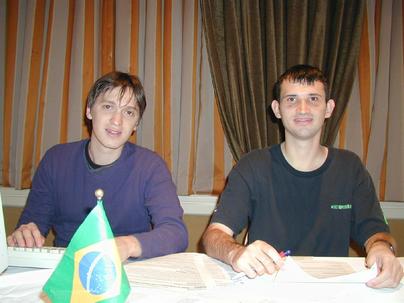
Sponsored by SIGDA
SIGDA Contact
Prof. Nikil Dutt
|
|
CADathlon 05 First Place Winners
Team:
Underdogs
Team Member: Jarrod Roy
Advisor: Igor Markov
University: University of Michigan
Team
Member: Matthew Guthaus
Advisors: Richard Brown and Dennis Sylvester
University: University of Michigan
|

|
Matthew is currently
a Ph.D. Candidate in Electrical Engineering at the
University of Michigan and expects to graduate near the beginning of
the 2006
calendar year. His dissertation research is on design automation of
robust
clock networks using parametric statistical STA. Other research
interests
include physical design automation, low-power architecture for embedded
systems, and algorithm specific microprocessors.
Jarrod received a
B.S. degree in Computer Science from
Carnegie
Mellon University in May 2001 and a M.S. degree in Computer Science
from the
University of Michigan at Ann Arbor in August 2005. He is currently a
Ph.D.
Candidate at the University of Michigan. His areas of research interest
include
VLSI physical design as well as SAT and QBF solving.
CADathlon 05 Honorable Mention (second-place)
Team: ChurrasCADa
Team Member:
Renato
Hentschke
Advisor: Ricardo Reis
University: Universidade Federal do Rio Grande do
Sul,
Brazil
Team Member: Gustavo Neuberger
Advisor: Ricardo Reis
University: Universidade Federal do Rio Grande do
Sul,
Brazil
|

|
Renato is a
PhD student at UFRGS working with place and route
algorithms for wire length, routability and timing optimization of 3D
circuits.
He achieved his master degree in computer science at UFRGS in 2002. His
research interests are timing and congestion driven physical design,
logic
synthesis for physical improvement and 3D integration.
Gustavo is a PhD
student at UFRGS working with design and
automatic
generation of fault-tolerant circuits, and effects of process
variability in
integrated circuits. He received his BS degree in Computer Engineering
at UFRGS
in 2003. His research interests include physical design, design of
fault
tolerant circuits, design for manufacturability and process
variability.
|


